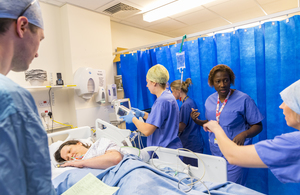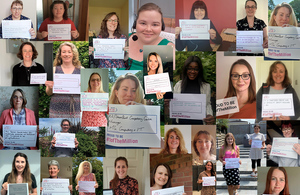I listened with great interest to the Rt Hon Member for Orkney and Shetland, who is a distinguished Member of this House and former holder of office in the coalition Government.
It is, of course, clear there are still some concerns about the return to physical proceedings and I am sympathetic to them: we are all trying our best to do right by our constituents at this difficult time.
I pay tribute to the work of all those across the House who have persevered despite the limitations of lockdown to help individuals and businesses in their constituencies. The Rt Hon Gentleman rightly said that Members of Parliament have been exceptionally busy in their constituencies, with a workload that for many has been higher than they have been expecting in ordinary time, but this is not an ordinary time.
We have to get the balance right between what can be done by shielding MPs and what allows Parliament to carry on doing its job. I fear that that is the key point, and I hope Members will understand that although their contributions have reflected their experiences and those of their party, it is our responsibility to consider Parliament’s work as a whole—not just the duties of individual MPs, but the duties of our Parliament to the British people.
Even the Rt Hon Member for Orkney and Shetland, who applied for and received this debate, has said that it was a sub-optimal system, and that has been the view of the Procedure Committee and it has been mentioned widely in debates. The legislative programme was running at a snail’s pace comparatively. We were not delivering on our promises to British voters, and that is the point: the most important way in which Parliament makes a real difference to the lives of our constituents is through legislation. Our democracy could not function without this essential work. It is how we translate the results of general elections into tangible change.
Legislation is how we translate the results of a general election into tangible change. In the Queen’s Speech, the Government unveiled 36 Bills—an ambitious agenda that aims to help the whole country level up. People across the United Kingdom will be affected by the laws we pass, so this House must play its part in working to ensure that these Bills are the best they can possibly be.
The Zoom Parliament allowed some scrutiny to take place, and I was an enthusiastic advocate of having it. On 21 April, the choice was a Zoom Parliament, or no Parliament. Not only did we see Ministers coming to the Despatch Box, but we were able to examine people’s homes and their bookcases. However, we also recognised its inadequacy. Hybridity was not sufficient.
Indeed, the Rt Hon Member for Orkney and Shetland accepted that there are real difficulties with the hybrid process and the stilted nature of the debate that we had in the virtual Parliament. He said that himself, so it is not as if I am the only one who thinks it did not work.
Meaningful engagement is what ministers want and it is what ministers need. Look at what has been happening in this debate. Questions are coming in at all angles, testing the Government’s view. Why? Because we are here physically. I am not closed minded as Leader of the House. If it could work, with people who are shielded and cannot be here zooming in and making interventions, I would not seek to stop that out of stubbornness, but I do not yet see how it is possible to make a debate like this, with a vibrant exchange of views. I have not counted how many interventions I have taken, but how would this debate have flowed? How could we have got the exchange of opinion with people randomly popping up? How would they have come in? Would there have been a tower of Babel as they shouted over each other? Would they have to be on mute or off mute, and how would we know when they came on? Would a list have to be prepared in advance? Would someone have to apply to Mr Speaker in advance to get on the list to intervene on what I was going to say before they knew what I was going to say? It is really difficult to make a debate work with virtual interventions.
A true Parliament of the people, in which our elected representatives come together to discuss fully and debate the Government’s agenda and their response to the events of the day, is what we need.
That covers what we are doing to fulfil the promises that we made at the general election and on which we were elected. I now turn to the question of how we conduct our proceedings in ways that lead by example.
Members of Parliament are no different from others who are unable to perform their jobs fully from home and are now returning to their workplaces. I understand that many Members will feel concerned about their particular circumstances, but they can be reassured by the significant changes made to make the parliamentary estate covid-19-secure. It is clear to anyone in Westminster that, while we have emerged from the initial stage of lockdown, we are by no means back to normal. That is why I made it clear before the Whitsun recess that I would work with the House authorities to explore ways in which those unable to come here can continue to contribute.
I have every sympathy with Members who feel that the constraints of the pandemic prevent them from being able to attend in Westminster. The work of scrutiny is so important that it is right that we have brought forward a motion to allow those affected to have their say during scrutiny proceedings, but I remain conscious of how important it is that Members who participate in the decision-making process of the House ought and need to do so in person. As we saw last week, the decision on whether to vote Aye or No is a public one, for which individual Members can often find themselves held to account. It is a decision that should only ever be taken after the kind of serious consideration and engagement which is only possible when all those concerned are in Westminster. By the time Members are asked to vote, Ministers want to have had the chance to talk through fully any specific concerns of individuals or groups. That remains my strong view.
I am grateful to the Procedure Committee for its willingness to support the Government’s desire to extend proxy voting. Last week, the House unanimously agreed to make this available to Members who are unable to attend at Westminster because they are at high risk from coronavirus because they are either clinically extremely vulnerable or clinically vulnerable. In making judgments of this kind, I have sought to balance the competing priorities of this place in a way that looks at Parliament as a whole. As I have maintained throughout, the Government are listening to Members across the House. I am—I hope this will please the Hon Member for Rhondda and the Rt Hon Member for Orkney and Shetland—giving thought to bringing forward a motion that extends proxy voting beyond what has already been agreed by the House, to include Members who are more widely affected by the pandemic.
Parliament must send a clear message to the country: we are getting on with our work as best we can during a period of great challenge, just like everyone else. That is the spirit in which I encourage all Members to view our proceedings during the pandemic. We recognise that there are difficulties, but we are showing leadership to the nation in persisting in our purpose. We are doing our duty in leading the way. Our constituents will not entertain the notion that we should ask parents to send their children back to school while we choose to remain at home.
Fortunately, that is not our approach. Rather than suffering the depredations of the muted hybrid Parliament, we are once again talking to each other in ways that were impossible when we were scattered to the four winds. Rather than wading through the treacle of the hybrid proceedings, which even the Rt Hon Member for Orkney and Shetland said were far from perfect, we are once again fleet of foot and dancing a legislative quickstep.
I have enjoyed the formalised interventions in this speech just as much as I enjoy the informal interventions of Members putting their socially distanced heads around my door. Rather like the school swot secretly delighted by extra homework, I must confess that my appetite for the opportunity of today’s debate is very great, even though some may think—and some of my hon. Friends have indicated that they do think—that talking about ourselves under the current circumstances is a little self-indulgent. For there is more to our democracy than general elections. Between polling days, it is in Parliament where the interplay between Ministers and MPs comes alive. I am delighted that that interplay, as we see today, is being restored, allowing our Parliament to scrutinise legislation properly and to get on with its core business of delivering for the British people.
Please note that interventions have been removed from this version. For a full transcript please visit Hansard, the official report of all parliamentary debates.


